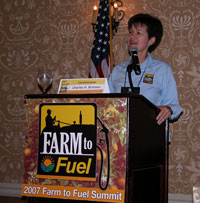 Recent rain in the Midwest has helped the corn crop rebound and led to lower corn prices, according to a Forbes article.
Recent rain in the Midwest has helped the corn crop rebound and led to lower corn prices, according to a Forbes article.
After as much as 6 inches of rain in eastern Iowa and western Illinois, much of corn crop received relief after a dry June.
In mid-June, a little more than half of Illinois’ corn crop was in good to excellent condition, according to USDA’s crop reports. Last week, that figure was 81%. In Iowa, it was still healthy at 63%, held down by dry conditions in the western end of the state.
Corn prices hit $4 a bushel in February, but cash-market corn has lowered to around $3.
“This has really helped to increased the profitability for ethanol producers,” said Rick Kment, an ethanol analyst with DTN, an Omaha, Neb.-based agricultural market information company.
“You can make very good returns at $3 corn,” says Dave Nelson, chairman of Minneapolis-based Global Ethanol LLC, which has plants in Iowa and Michigan. “When it gets to $4, it gets pretty tight.”
“A meaningful decline in corn prices would suggest the potential for improving profitability and drive ethanol stock prices up,” Citibank analyst David Driscoll, who expects corn prices to level off at $2.75 a bushel in the long term, wrote in a note to investors.


 The American Wind Energy Association is calling on Congress to enact a Renewable Electricity Standard (RES). Leaders from the AWEA will join with Congressmen Tom Udall (D-NM) and Mark Udall (D-CO) on Tuesday, July 31st at 10 a.m. at the U.S. Capitol to call for wider support of the amendment that would require power companies to use 20 percent renewable sources to produce energy by the year 2020. Pennsylvania Congressman Todd Platts (R. PA) is also a co-sponsor of the measure.
The American Wind Energy Association is calling on Congress to enact a Renewable Electricity Standard (RES). Leaders from the AWEA will join with Congressmen Tom Udall (D-NM) and Mark Udall (D-CO) on Tuesday, July 31st at 10 a.m. at the U.S. Capitol to call for wider support of the amendment that would require power companies to use 20 percent renewable sources to produce energy by the year 2020. Pennsylvania Congressman Todd Platts (R. PA) is also a co-sponsor of the measure. At the recent Farm to Fuel Summit in Florida, the state’s chief financial officer told the crowd that biofuels have made it into the mainstream.
At the recent Farm to Fuel Summit in Florida, the state’s chief financial officer told the crowd that biofuels have made it into the mainstream.  CFO Alex Sink related a story of how she had gone into her local Circle K convenience store that morning for coffee and newspapers on the way to the conference and the clerk at the counter noticed her “Farm to Fuel” shirt and asked her what she did. “I said I’m getting ready to go to a conference to talk about ways to grow crops to turn into fuel,” Sink said. “And she said, ‘You mean like ethanol?’ and I said ‘yeah’ and she said ‘that’s good, that’s very good, we need to protect our ozone layer.'”
CFO Alex Sink related a story of how she had gone into her local Circle K convenience store that morning for coffee and newspapers on the way to the conference and the clerk at the counter noticed her “Farm to Fuel” shirt and asked her what she did. “I said I’m getting ready to go to a conference to talk about ways to grow crops to turn into fuel,” Sink said. “And she said, ‘You mean like ethanol?’ and I said ‘yeah’ and she said ‘that’s good, that’s very good, we need to protect our ozone layer.'”
 The nation’s largest dry mill ethanol producer was recently honored by U.S. troops serving in Iraq.
The nation’s largest dry mill ethanol producer was recently honored by U.S. troops serving in Iraq.  During the presentation at POET headquarters in Sioux Falls, SD, Major Chontos noted that the US Air Force is the highest fuel consumer of all the military branches. During a training weekend at the South Dakota Air National Guard, 10 F-16s typically fly two missions a day for two days consuming 60,000 gallons of fuel. One mission uses 1,500 gallons of fuel. At Camp Sather, 10,000 gallons of fuel are used per day for air conditioning and other electrical generation to support 1,000 airmen.
During the presentation at POET headquarters in Sioux Falls, SD, Major Chontos noted that the US Air Force is the highest fuel consumer of all the military branches. During a training weekend at the South Dakota Air National Guard, 10 F-16s typically fly two missions a day for two days consuming 60,000 gallons of fuel. One mission uses 1,500 gallons of fuel. At Camp Sather, 10,000 gallons of fuel are used per day for air conditioning and other electrical generation to support 1,000 airmen. Meanwhile, the
Meanwhile, the  A target audience for the device will be contractors, particularly ones who work on downtown skyscrapers. Power tools regularly sap their batteries.
A target audience for the device will be contractors, particularly ones who work on downtown skyscrapers. Power tools regularly sap their batteries.  “I’m proud that the first ethanol plant in the nation to receive the SHARP award is a Kansas business,” Sebelius said. “Congratulations to White Energy and its employees on creating a safe work environment for this outstanding recognition. The award reinforces our state’s dedication to workplace safety and the future of ethanol and other renewable fuels production.”
“I’m proud that the first ethanol plant in the nation to receive the SHARP award is a Kansas business,” Sebelius said. “Congratulations to White Energy and its employees on creating a safe work environment for this outstanding recognition. The award reinforces our state’s dedication to workplace safety and the future of ethanol and other renewable fuels production.” Companies worried about the quality level of biodiesel they’re selling… or buying… can now use a biodiesel testing kit that fits into a brief case. In fact, the Kittiwake Biodiesel test kit comes in a sturdy, aluminum case to make it easier to take anywhere.
Companies worried about the quality level of biodiesel they’re selling… or buying… can now use a biodiesel testing kit that fits into a brief case. In fact, the Kittiwake Biodiesel test kit comes in a sturdy, aluminum case to make it easier to take anywhere. The ethanol industry is starting to get fed up with being blamed for higher food prices.
The ethanol industry is starting to get fed up with being blamed for higher food prices. Ethanol has also been blamed for rising prices of everything from popcorn to milk recently, but the facts indicate weather and high energy costs should be taking the brunt of the blame, with an early freeze, low worldwide supplies of wheat, low milk production and rising energy costs being the driver, according to a
Ethanol has also been blamed for rising prices of everything from popcorn to milk recently, but the facts indicate weather and high energy costs should be taking the brunt of the blame, with an early freeze, low worldwide supplies of wheat, low milk production and rising energy costs being the driver, according to a